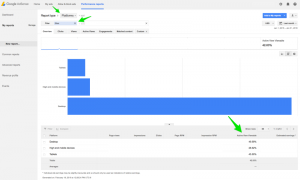— October 8, 2018

If yours is like most companies, your business derives a lot of prospective customers and new web visits from paid search – that is, the ads you run on Google, Bing, Yahoo, etc.
In 2017, companies spent an estimated $ 35 billion on paid search, which represented nearly 50% of their total digital marketing budgets.
With such a high percentage of our money going to one channel, the inevitable questions surrounding its effectiveness come up. What am I getting for that money? How many new customers are attributed to paid search? What is my ROI?
No company wants to artificially limit the amount of new customers they can reach with their advertising. But the fact is that we don’t have unlimited advertising budgets to work with. And so we have to spread the money around in a way that makes the most sense.
Therefore, if there are ways to save money on paid search without impacting its effectiveness, we should figure out what those are and implement them as soon as possible.
As luck would have it, there are three simple ways to save money on paid search. They are…
1) Mind Your Exclusions
If your goal is to save money without impacting sales, then the first thing you are going to want to do is stop spending money where it isn’t working. This is very easy to do, because of all the tools you have at your disposal. Each of the major search platforms allows you to track where your clicks are coming from, how much you are spending on them, and how many conversions (or sales) they are delivering.
When you find keywords or phrases that are costing you money but not leading to any new business, it is easy to exclude them from your campaigns. And if you are spending money on content campaigns and remarketing, you can find those websites or categories of sites that your ads are showing up on but not driving conversions. And you can exclude them as well, so your ads stop showing up there and costing you money.
When you eliminate keywords and placements in your campaign that are wasting money, you have more money in your budget that you can put toward the keywords and placements that work.
2) Improve Your Conversion Rate
We may view the amount of money you’re spending on paid search and the performance of your site as two completely separate items. But that view is too narrow, ignoring the very real consequences (or should I say benefits) of conversion rate optimization.
While it may not be as simple as exclusions are, taking the steps necessary to improve on-site conversion rate will absolutely save you money on paid search. When a higher percentage of the overall traffic you are driving to the site takes the desired action, each one of those conversions costs you less, thereby driving the same number of sales at a lower total spend.
What you choose to do with the savings is up to you – either spend it on driving even more qualified traffic to this newly optimized site of yours, or pocket it as a cost reduction.
3) Own Your Brand Terms
Brand terms are an area up for some debate. Depending on what advice you listen to or whose article you read, you will hear competing directives.
Some say you should not bother bidding on your brand terms in search because that traffic is likely to find you regardless. After all, they are searching for you directly.
But others say that you should bid on your brand terms for a few reasons, chief among them the fact that your competitors can bid on your brand terms in an attempt to “steal” that traffic. By bidding on your own terms, you make that very real possibility less likely.
Regardless of whose side you take in that argument, the fact is that by eliminating the need to bid on your brand terms will save you money. So my advice to you is to monitor those terms closely, make sure the organic results on the first page of Google are what you want them to be, and keep an eye on where your competition is showing up. If you can avoid spending extra money on those terms without losing out on any of the traffic, go for it.
Digital & Social Articles on Business 2 Community
(29)









